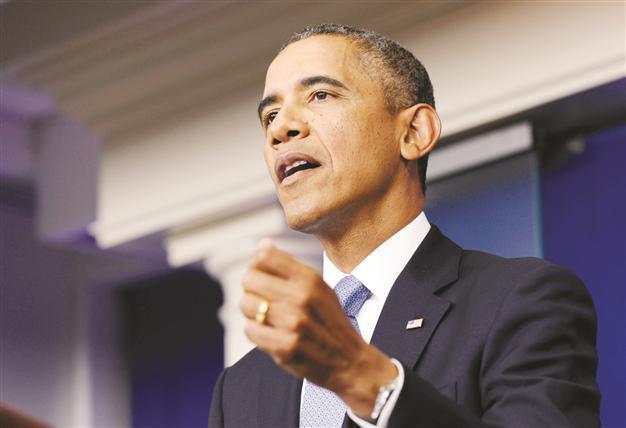US still deadlocked on shutdown, worries arise
NEW YORK/WASHINGTON - Reuters

Some Democrats have begun to consider asking Obama to unilaterally raise the debt ceiling on
his own . The White House has said that approach is not feasible. AP photo
U.S. President Barack Obama met with Republican and Democratic leaders in Congress late Wednesday to try to break a budget deadlock that has shut wide swaths of the federal government, but there was no breakthrough and both sides blamed each other.
After more than an hour of talks, House of Representatives Speaker John Boehner said Obama refused to negotiate, while House Democratic Leader Nancy Pelosi and Senate Majority Leader Harry Reid accused Republicans of trying to hold the president hostage over Obamacare.
Reid said Obama told Republicans “he will not stand” for their tactics. The White House later issued a statement saying that Obama remains hopeful that “common sense will prevail.”
There was little to encourage hope for a quick solution to the two-day-old shutdown and hundreds of thousands of federal employees remained off the job without pay.
The shutdown has raised questions about Washington’s ability to carry out its most essential duties.
The shutdown has closed landmarks like the Grand Canyon, cut off government economic data reports and prevented some cancer patients from receiving cutting-edge treatment.
United Technologies Corp, which makes Sikorsky helicopters and other items for the military, said it would be forced to furlough as many as 4,000 employees if the U.S. government shutdown continues through next week, due to the absence of government quality inspectors.
Wall Street ‘should be worried’ The shutdown fight is rapidly merging with a higher-stakes battle over the government’s borrowing power that is expected to come to a head soon.
Treasury Secretary Jack Lew has said the United States will exhaust its $16.7 trillion borrowing authority no later than Oct. 17.
The government could have difficulty paying pension checks, interest charges and other bills after that point.
Many Republicans see the debt limit vote as another opportunity to undercut Obama’s healthcare law or extract other concessions - an approach that business groups say could lead to disaster.
“You can re-litigate these policy issues in a political forum, but they shouldn’t use the threat of causing the U.S. to fail on its ... obligations to repay on its debt as a cudgel,” Goldman Sachs chief executive Lloyd Blankfein told reporters after he and other financial-industry executives met with Obama.
Some Democrats have begun to consider asking Obama to unilaterally raise the debt ceiling on his own - a move that could lead to years of court battles. The White House has said that approach is not feasible.
Obama said Wall Street should be worried about the debt ceiling. “I think this time’s different. I think they should be concerned,” Obama told CNBC television in an interview before meeting the congressional leaders. “When you have a situation in which a faction is willing potentially to default on U.S. government obligations, then we are in trouble.”
“Am I exasperated? Absolutely I’m exasperated. Because this is entirely unnecessary,” Obama told CNBC. “I am exasperated with the idea that unless I say to 20 million people, ‘You can’t have health insurance,’ these folks will not reopen the government. That is irresponsible.”
The U.S. Army’s top general said the shutdown was significantly harming day-to-day operations, and intelligence leaders say it is undermining their ability to monitor threats. A Federal Reserve official said it could delay the central bank’s ability to assess whether its monetary stimulus efforts are still needed.The last shutdown in 1995 and 1996 cost taxpayers $1.4 billion.
A short-term shutdown would slow U.S. economic growth by about 0.2 percentage points, Goldman Sachs said on Wednesday, but a weeks-long disruption could weigh more heavily - 0.4 percentage points - as furloughed workers scale back personal spending.
